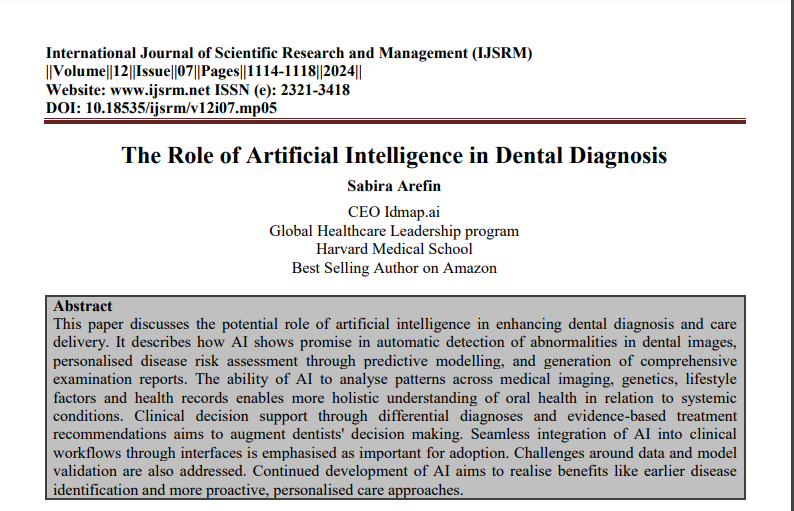
Submission to VIJ 2024-07-21
Keywords
- Artificial Intelligence
Copyright (c) 2024 Sabira Arefin

This work is licensed under a Creative Commons Attribution 4.0 International License.
Abstract
This paper discusses the potential role of artificial intelligence in enhancing dental diagnosis and care delivery. It describes how AI shows promise in automatic detection of abnormalities in dental images, personalised disease risk assessment through predictive modelling, and generation of comprehensive examination reports. The ability of AI to analyse patterns across medical imaging, genetics, lifestyle factors and health records enables more holistic understanding of oral health in relation to systemic conditions. Clinical decision support through differential diagnoses and evidence-based treatment recommendations aims to augment dentists' decision making. Seamless integration of AI into clinical workflows through interfaces is emphasised as important for adoption. Challenges around data and model validation are also addressed. Continued development of AI aims to realise benefits like earlier disease identification and more proactive, personalised care approaches
References
- Series Science. (2023, December 27). Artificial Intelligence in Healthcare: Explore the Applications of AI in Various Medical Domains, Such as Medical Imaging, Diagnosis, Drug Discovery, and Patient Care. SeriesScience International | Open Access Journals | Peer Reviewed Articles. https://seriesscience.com/artificial-intelligence-healthcare/#:~:text=Ensuring%20the%20robustness%20and%20generalizability
- Alotaibi, G., Awawdeh, M., Farook, F. F., Aljohani, M., Aldhafiri, R. M., & Aldhoayan, M. (2022). Artificial intelligence (AI) diagnostic tools: utilizing a convolutional neural network (CNN) to assess periodontal bone level radiographically—a retrospective study. BMC Oral Health, 22(1). https://doi.org/10.1186/s12903-022-02436-3
- Batra, A. M., Reche, A., Batra, A. M., & Reche, A. (2023). A New Era of Dental Care: Harnessing Artificial Intelligence for Better Diagnosis and Treatment. Cureus, 15(11). https://doi.org/10.7759/cureus.49319
- Bethesda. (2021). Effect of Oral Health on the Community, Overall Well-Being, and the Economy. In www.ncbi.nlm.nih.gov. National Institute of Dental and Craniofacial Research (US). https://www.ncbi.nlm.nih.gov/books/NBK578297/
- Engle, R. L., Mohr, D. C., Holmes, S. K., Seibert, M. N., Afable, M., Leyson, J., & Meterko, M. (2021). Evidence-based practice and patient-centered care: Doing both well. Health Care Management Review, 46(3), 174–184. https://doi.org/10.1097/HMR.0000000000000254
- Florkow, M. C., Willemsen, K., Mascarenhas, V. V., Oei, E. H. G., Stralen, M., & Seevinck, P. R. (2022). Magnetic Resonance Imaging Versus Computed Tomography for Three‐Dimensional Bone Imaging of Musculoskeletal Pathologies: A Review. Journal of Magnetic Resonance Imaging. https://doi.org/10.1002/jmri.28067
- Haleem, A., Javaid, M., Singh, R. P., & Suman, R. (2021). Telemedicine for healthcare: Capabilities, features, barriers, and applications. Sensors International, 2(2). https://doi.org/10.1016/j.sintl.2021.100117
- Krishnan, G., Singh, S., Pathania, M., Siddharth Gosavi, Shuchi Abhishek, Ashwin Parchani, & Dhar, M. (2023). Artificial intelligence in clinical medicine: catalyzing a sustainable global healthcare paradigm. Frontiers in Artificial Intelligence, 6. https://doi.org/10.3389/frai.2023.1227091
- Medigy. (2024, January 16). Artificial Intelligence. Medigy.com. https://www.medigy.com/topic/healthcare-it-news-artificial-intelligence/
- Ng, K., Sun, J., Hu, J., & Wang, F. (2015). Personalized Predictive Modeling and Risk Factor Identification using Patient Similarity. AMIA Joint Summits on Translational Science Proceedings. AMIA Joint Summits on Translational Science, 2015, 132–136. https://www.ncbi.nlm.nih.gov/pmc/articles/PMC4525240/
- Rauschecker, A. M., Rudie, J. D., Xie, L., Wang, J., Duong, M. T., Botzolakis, E. J., Kovalovich, A. M., Egan, J., Cook, T. C., Bryan, R. N., Nasrallah, I. M., Mohan, S., & Gee, J. C. (2020). Artificial Intelligence System Approaching Neuroradiologist-level Differential Diagnosis Accuracy at Brain MRI. Radiology, 295(3), 626–637. https://doi.org/10.1148/radiol.2020190283
- Scheinfeld, M. H., Shifteh, K., Avery, L. L., Dym, H., & Dym, R. J. (2012). Teeth: What Radiologists Should Know. RadioGraphics, 32(7), 1927–1944. https://doi.org/10.1148/rg.327125717
- Tözüm, T. F., & Taguchi, A. (2004). Role of dental panoramic radiographs in assessment of future dental conditions in patients with osteoporosis and periodontitis. The New York State Dental Journal, 70(1), 32–35. https://pubmed.ncbi.nlm.nih.gov/15042795/
- Vodanović, M., Marko Subašić, Milošević, D., & Ivana Savić Pavičin. (2023). Artificial Intelligence in Medicine and Dentistry. Acta Stomatologica Croatica, 57(1), 70–84. https://doi.org/10.15644/asc57/1/8
- Arefin, S. (2024). Health Equity and Solutions in the United States Healthcare System. Integrated Journal of Science and Technology, 1(5), 1-9.
- Arefin, S., Kipkoech, G., & Arefin, S. (2024). Nurturing Mental Strength and Fostering Inclusive Leadership in Women. Innovative Social Sciences Journal, 10(1), 1-8.